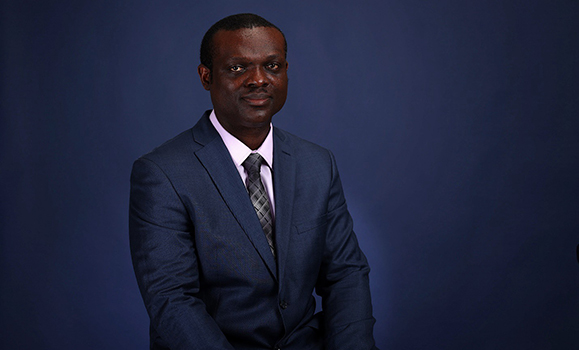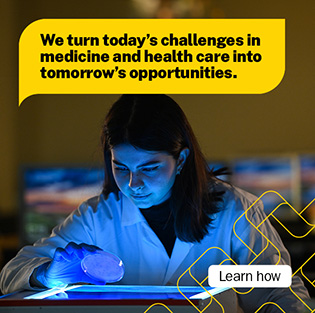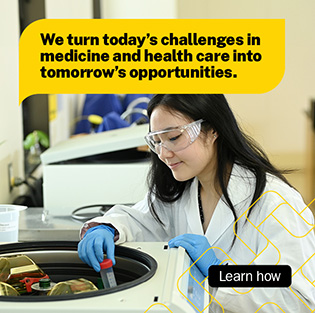A new national program spearheaded by ±«Óătv’s Department of Psychiatry will offer mental-health support to physicians, residents, and medical students across Canada.
Wellness4MDs delivers daily supportive text messages in English or French to subscribers for six months at no cost. The program aims to significantly reduce levels of stress, anxiety, burnout, and depression commonly experienced by physicians, residents, and medical students.
“I’ve been involved in physician panel studies that suggest there are high levels of burnout in physicians, residents, and medical students,” says Dr. , head of psychiatry at Dal, chief of psychiatry for Nova Scotia Health’s Central Zone, and the program’s lead researcher.
“We also know doctors typically don’t use traditional mental-health services until sometimes it’s too late, which means many people suffer in isolation without really reaching out to seek the supports they need.”
This could be due to stigma associated with mental health, or physicians may be too busy for self-care, which is unfortunate, he says.

Dr. Vincent Agyapong.
Dr. Agyapong’s Global Mental Health Research Group based at ±«Óătv and the University of Alberta designed Wellness4MDs. The service’s text messages are based on cognitive behavioural therapy principles and were developed by psychiatrists, mental health therapists, clinical psychologists, and mental health service users.Ěý
Wellness4MDs is funded by the Royal College of Physicians and Surgeons of Canada Foundation, the Global Psychological eHealth Foundation, Mental Health Foundation in Alberta, the Royal Bank of Canada Foundation with support from Dal’s Department of Psychiatry, the Division of Community Psychiatry at the University of Alberta, and in partnership with Alberta Health Services.
Interested? Sign up now by texting “WELLMD” for English access or “BIENMD” for French access to 1-855-947-4673. Subscribers can opt in to participate in the program evaluation by completing surveys when they begin the program and at designated follow-up times.
A growing problem
With increasing levels of burnout, anxiety, and depression negatively impacting the healthcare workforce, the need to support physician mental health and well-being is great.
 “The mental health of our doctors, nurses, and allied health professionals are a priority,” says DeAnn Hunter, chair of the Mental Health Foundation in Alberta's Board of Trustees. “They are on the front lines every day, providing care and comfort to those in need, often at the expense of their own well-being.”
“The mental health of our doctors, nurses, and allied health professionals are a priority,” says DeAnn Hunter, chair of the Mental Health Foundation in Alberta's Board of Trustees. “They are on the front lines every day, providing care and comfort to those in need, often at the expense of their own well-being.”
“Contributing to Wellness4MDs’ launch and success in support of the mental health and well-being of Canadian physicians, postgraduate medical trainees, and medical students is important to us and we look forward to the program’s growth in the short- and long-term,” says Craig Ceppetelli, executive director of the Royal College of Physicians and Surgeons of Canada’s Office of International Collaboration and Advancement and chief operating officer of Royal College Canada International.
Messages will also include links to mental health resources that could help improve their resilience and mental well-being, says Dr. Agyapong.
Another plus is how easily the program will fit within the busy lives of participants. The program is anonymous and doesn’t require much effort from physicians, he says.
“Physicians across Canada work hard to keep Canadians healthy, and it is right that we have an intervention that helps support their psychological well-being,” says Belinda Agyapong, president and CEO of the Global Psychological eHealth Foundation.
Recommended reading:ĚýDal launching Atlantic Canada’s first Master of Nursing program in mental health and addictions
A proven model
Wellness4MDs builds on the success of the researchers’ other text message-based mental health programs which have been shown to improve clinical symptoms and have a high user satisfaction.
The program is powered by ResilienceNHope software, an online application that delivers the suite of supportive text and e-mail messaging programs developed by Dr. Agyapong’s research group and is operated by the Global Psychological eHealth Foundation.
Dr. Agyapong’s group specializes in designing, implementing, and evaluating e-mental health programs that support global efforts at closing the mental health literacy and psychological treatment gaps for mental disorders.
“There’s evidence from our other programs such as the Text4Hope program, the Text4PTSI program, and the MoreGoodDays program, that this is an intervention that actually works,” says Dr. Agyapong.
Subscribers will be asked to complete voluntary surveys so researchers can measure the program’s effectiveness. After six months, participants can resubscribe to continue receiving the text messages.
Reaching as many in need as possible
A key aspect of Wellness4MDs is that it’s available in both of Canada’s official languages. Although the program is not the first the research group has made available in multiple languages, it is the first delivered on a national scale.
“The vision is to reach as many physicians, residents, and medical students across the country as possible to offer support,” says Dr. Agyapong.
While requiring only a small investment of resources, the program’s impact could be massive. Not only does Wellness4MDs have potential to reach thousands of physicians, residents, and medical students across Canada, the program is scalable and can be adapted to reach the health workforce globally, including nurses and other allied health professionals.
“It’s a feel-good effect that you can be able to use very minimal resources to achieve so much impact. It speaks to the power of innovation, the power of technology,” says Dr. Agyapong.


